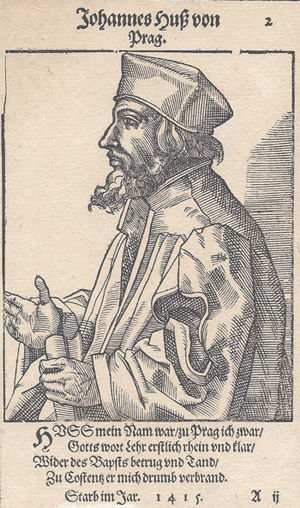
On this date in 1415, the Czech religious reformer Jan Hus (in English, John Hus or Huss), condemned as a heretic against the doctrines of the Catholic Church, was burned at the stake. This date has long been a Czech national holiday in his honor.
The story of Jan Hus (born ca. 1369) is more than a question of internal church disputes. As a priest, philosopher, and Master at Charles University in Prague, he is considered, after John Wycliffe, the English theorist of ecclesiastical Reformation, the first church reformer, living before Martin Luther, John Calvin and Huldrych Zwingli.
Hus was a key predecessor to the Protestant movement of the 16th century. His teachings had a strong influence on the establishment of a reformist Bohemian religious denomination and, more than a century later, on Martin Luther himself.
A century after his death, as many as 90 percent of inhabitants of the Czech lands were non-Catholic; to this day some still follow the teachings of Hus. In asserting their independence from Rome, the Hussites represented an early expression of Czech nationalism.
After earning two university degrees, Hus was ordained as a priest in 1400. In 1402 Hus began preaching in Prague demanding the reformation of the Church.
Hus tried to delineate the moral failings of clergy, bishops, and even the papacy from his pulpit. He enjoyed some local support, but on June 24, 1405, Pope Innocent VII, directed Hus’s archbishop to counter Wycliffe’s heretical teachings, and to ban any further attacks on the clergy. Hus, however, continued to promote Wycliffe’s ideas.
Like Wycliffe, Hus spoke out against indulgences. Hus asserted that no pope or bishop had the right to take up the sword in the name of the Church; that a Christian should pray for his enemies and bless those who curse him; and that a person obtains forgiveness of sins by true repentance, not by a donation of money to the church. Hus’s followers considered the church a fraudulent mob of adulterers and “Simonists,” people who bought their positions.
To some, Hus’s efforts were predominantly designed to rid the Church of its ethical abuses, rather than a campaign of sweeping theological change. To others, the seeds of the Reformation are clear in Hus’s and Wycliffe’s writings. In explaining the plight of the average Christian in Bohemia, Hus wrote, “One pays for confession, for mass, for the sacrament, for indulgences, for churching a woman, for a blessing, for burials, for funeral services and prayers. The very last penny which an old woman has hidden in her bundle for fear of thieves or robbery will not be saved. The villainous priest will grab it.”
In response, three men from the lower classes who openly called the indulgences a fraud were beheaded. They were later considered the first martyrs of the Hussite Church.
Martyrdom and vindication
Sigismund of Hungary, who was “King of the Romans” (i.e., head of the Holy Roman Empire, though not then Emperor), and heir to the Bohemian crown, was anxious to end religious dissension within the Church. He arranged for a general council to convene in November 1414, at Konstanz in southern Germany, on Lake Constance just across from Switzerland. The Council of Constance (1414-1418) became the 16th ecumenical council recognized by the Catholic Church. Hus willingly agreed to go to Konstanz, under Sigismund’s promise of safe conduct.
A few weeks after his arrival in Konstanz, Hus was arrested and thrown into the dungeon of the Dominican monastery. In December a formal investigation against Hus began, but Hus was not allowed an advocate for his defense. Transferred to the castle of the Archbishop of Konstanz, Hus was kept for 73 days, separated from his friends, chained day and night, poorly fed, and ill.
On June 5, 1415, his trial began, and Hus was moved to a Franciscan monastery. He declared himself willing to recant if his errors should be proven to him from the Bible, but otherwise defended his reformist protests against the Church.
The condemnation took place on July 6, 1415, in the presence of the assembly of the Council in the Cathedral. After the High Mass and Liturgy, Hus was led into the church. He protested that even at this hour he did not wish anything, but to be convinced from Scripture. He fell upon his knees and asked God to forgive all his enemies.
At the place of execution, he knelt down, spread out his hands, and prayed aloud. The executioner undressed him, tied his hands behind his back, and bound his neck with a chain to a stake around which wood and straw had been piled up so that it covered him to the neck. At the last moment Hus refused to recant and thus save his own life.
“God is my witness that the things charged against me I never preached,” Hus said. “In the same truth of the Gospel which I have written, taught, and preached, drawing upon the sayings and positions of the holy doctors, I am ready to die today.”
Hus’s ashes were thrown into the Rhine River.
Responding with horror to Hus’s execution, the people of Bohemia moved even more rapidly away from papal teachings, prompting an announced crusade against them. Pope Martin V issued a papal bull that all supporters of reformers like Hus and Wycliffe be slaughtered. Some two thousand Hussites were thrown into the Kutná Hora mines by pro-Catholic townsmen. The Hussite community became a major military power, and defeated a wave of crusades that lasted until 1434. Fighting ended with a compromise in 1436.
According to Hus, the Church is not the hierarchy; it is the entire body of those who have been predestined for salvation. Christ, not the pope, is its head. It is no article of faith that one must obey the pope to be saved. Neither membership in the Church nor churchly offices and dignities assure that the persons in question are members of the true Church. Hus’s theology predates by almost a century similar developments that would take place in the Lutheran Reformation. His extensive writings earn him a prominent place in Czech literary history.
Nearly six centuries later in 1999, Pope John Paul II expressed “deep regret for the cruel death inflicted” on Hus. Cardinal Miloslav Vlk of the Czech Republic was instrumental in crafting John Paul II’s statement.
Adapted from Wikipedia.
Photo: Wikimedia (CC)












Comments